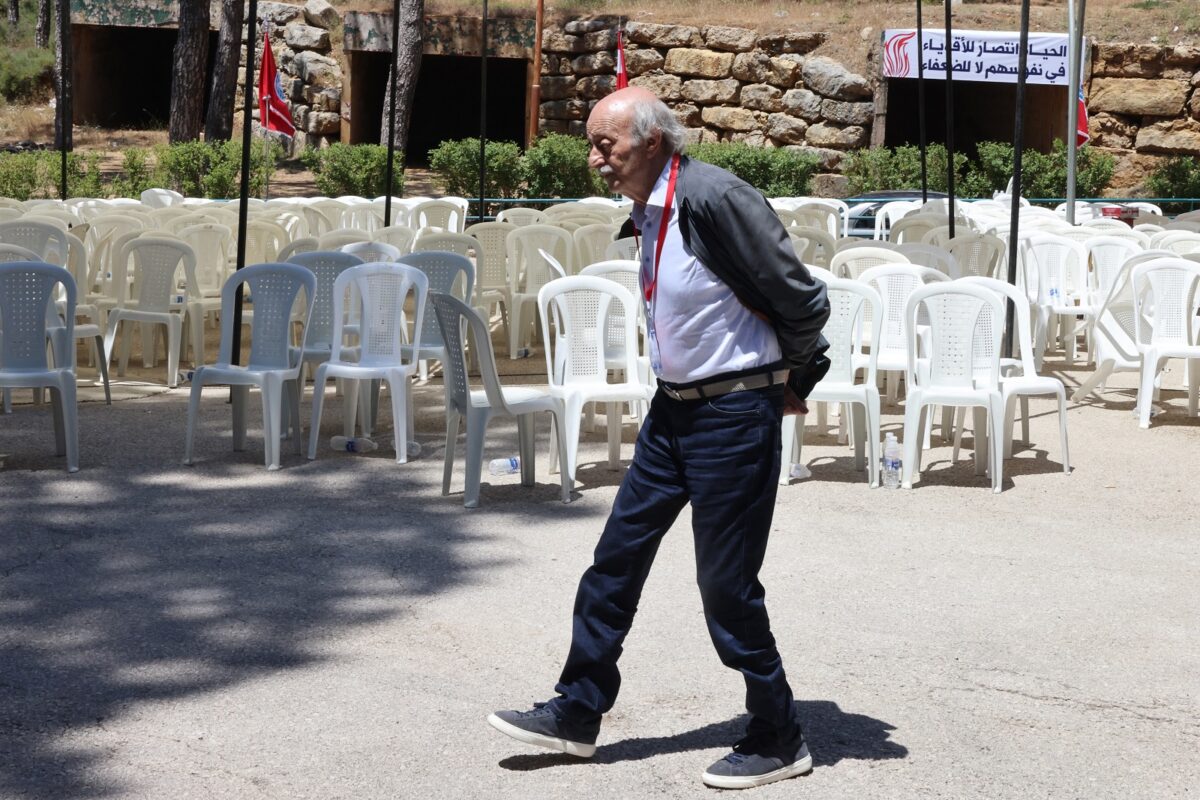
While protecting the Druze amidst Lebanon’s volatile political landscape, Walid Joumblatt’s shifting political alliances might undermine the long-term autonomy and influence of the community
Recently, Walid Joumblatt, the influential leader of the Druze community in Lebanon, made headlines by expressing support for Hezbollah amidst escalating regional tensions. This stance has sparked friction within the Druze community and outside of it alike, raising questions about his shifting political alliances. Joumblatt’s history of changing positions is well-documented, with supporters arguing that these moves are strategic, aimed at protecting the Druze amidst Lebanon’s volatile political landscape. However, this approach has also faced significant criticism.
Joumblatt’s political career after 2009 has been marked by frequent shifts. From initially opposing Hezbollah and the Assad regime to later appeasing them during the Syrian civil war, Joumblatt’s actions reflect a pragmatic adaptation to changing regional dynamics. His supporters argue that these shifts are necessary to protect the Druze community from external threats and to maintain political stability in Lebanon. Joumblatt’s recent support for Hezbollah is seen as a continuation of this strategy, aligning with powerful factions to ensure the Druze are not isolated or targeted in regional conflicts.
However, this strategic pragmatism has its downsides. Joumblatt has been accused of preventing Druze families from establishing large-scale businesses in areas he politically controls and administratively influences, such as the Chouf district. This control is seen as a means to maintain his political monopoly, but it stifles economic growth and entrepreneurship within the Druze community. By requiring major stakes in business ventures ( at least as he is accused) , Joumblatt’s actions contradict his public stance against corruption, undermining economic opportunities for the Druze and limiting their ability to improve their socio-economic status.
Additionally, Joumblatt’s political trade-offs have resulted in significant concessions within Lebanon’s power-sharing dynamics. Over the past two decades, he has relinquished important state positions to various counterparts, primarily to Shia factions, particularly the Amal Movement and its leader, Nabih Berri. These concessions have marginalized the Druze within Lebanon’s political framework, diminishing their influence and power. Many argue that, despite Joumblatt’s intentions of protecting the Druze and avoiding conflict by waiting for favorable political shifts, the community has lost more than it has gained. Historically significant in the establishment of Lebanon, the Druze have seen their political clout wane due to these strategic compromises.
Raising critical questions
This raises critical questions about the long-term viability of Joumblatt’s approach. While his actions might prevent immediate conflict and protect the Druze from external threats, they also risk reducing the community to a disadvantaged minority. Joumblatt’s strategy of avoiding conflict through compromise and alignment with powerful factions may ensure short-term stability, but it potentially undermines the long-term autonomy and influence of the Druze.
Where do we draw the line between strategic pragmatism and sacrificing community interests? Joumblatt’s intention to protect the Druze is not in question; however, the effectiveness of his approach is debatable. The community’s reduced influence in government and restricted economic opportunities suggest that his strategy might be more detrimental in the long run. The Druze community, if kept on this path, could face significant disadvantages, becoming increasingly reliant on external support.
Therefore, while Joumblatt’s pragmatism has shielded the Druze in Lebanon from immediate threats, it is crucial to evaluate whether this approach truly serves their long-term interests and overall presence. This is especially pertinent given the Druze position and status in neighboring countries, where they are increasingly finding themselves as the sole opposition to majority rulings and regional geopolitics. Protecting the Druze should not solely rely on avoiding conflict or aligning with the prevailing power. The community’s future may well depend on reclaiming political positions, fostering economic growth, and ensuring that strategic decisions do not compromise their autonomy and influence. The Druze must assess whether Joumblatt’s strategy aligns with their long-term aspirations or if it necessitates a revaluation to prevent further marginalization.
Ramzi Abou Ismail is a political psychologist and researcher at the University of Kent.
The views in this story reflect those of the author alone and do not necessarily reflect the beliefs of NOW.








